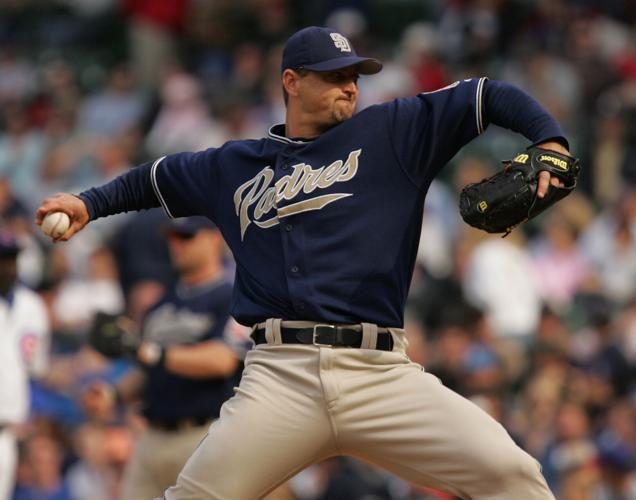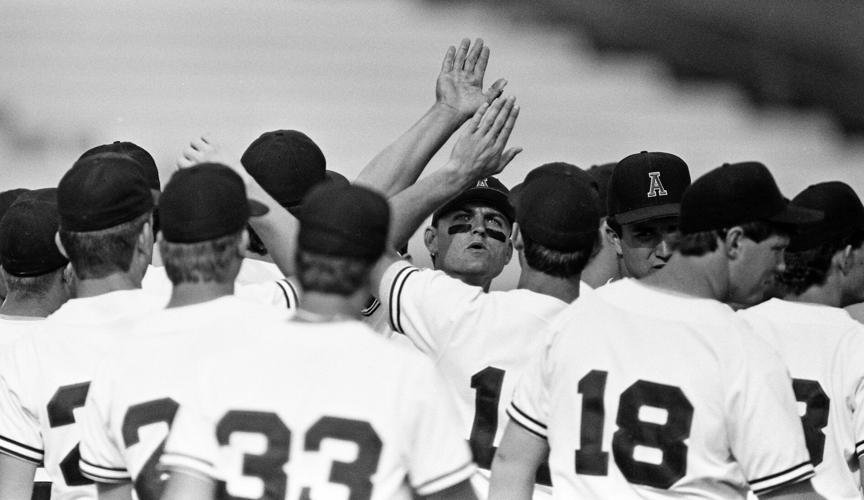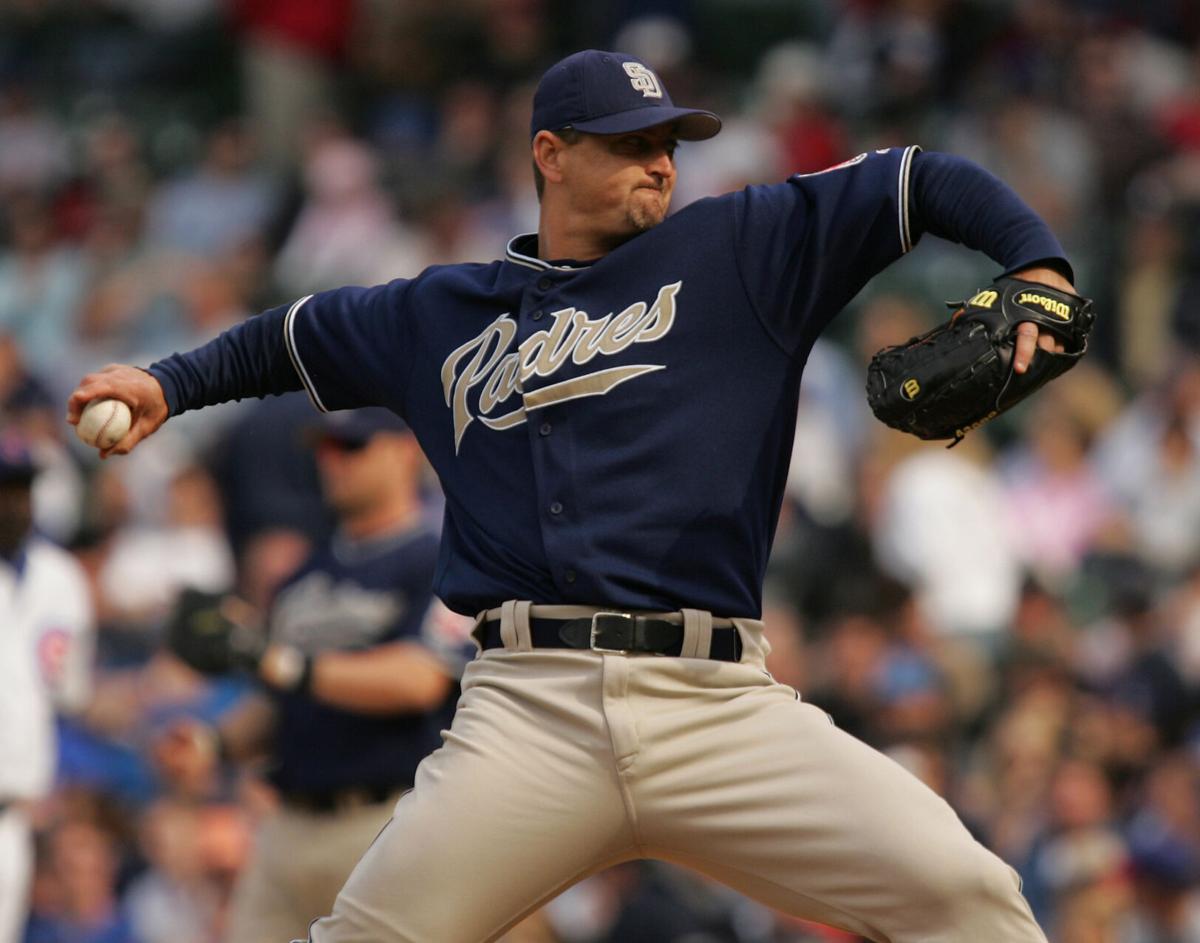Thursday’s Barstool Sports Arizona Bowl Kickoff Luncheon will feature three speakers.
Trevor Hoffman will, fittingly, go last.
Few pitchers in baseball history have owned the ninth inning like Hoffman, a former Arizona Wildcats shortstop who converted to a pitcher in the minor leagues and then racked up 601 big-league saves, most of them with the San Diego Padres.
The right-hander figures to see many familiar faces during his time here. Hoffman has been a frequent visitor since retiring from the big leagues a decade ago, whether it’s playing in the Cologuard Classic Pro-Am, visiting Hi Corbett Field to have his jersey retired or simply catching up with old friends and teammates.
“It’s always fun to come back to Tucson and drive around a little bit and just take it all in,” Hoffman said. “Unfortunately, it’s starting to get longer and longer away from the time I was there, but there’s certainly a lot of fond memories from my Tucson days.”
Hoffman will speak alongside recently retired UA softball coach Mike Candrea and Barstool CEO Erika Nardini at Thursday’s luncheon, which takes place at the Tucson Convention Center’s Main Ballroom. The Hall of Fame closer joined “Spears and Ali” on ESPN Tucson earlier this week to talk about his time at Arizona, relationship with coach Chip Hale and thoughts on the changes being made in minor-league baseball:
When you think about your time at Arizona, what stands out to you?
A: “It starts in the dorm room. Graham-Greenlee dorms were the first sights of where I was going to be on campus, and then going to Arizona Stadium to watch football games and then we had locker rooms in McKale (Center) and we shared it with all of the other athletes. It was just such a tight-knit community and I enjoyed being on campus. Those are some great memories.”
Who were some other high-profile athletes at Arizona while you were a student?
A: “Our football team was loaded. Chuck Cecil, Tedy Bruschi, Dick Tomey, our football coach. And then basketball was loaded with Steve Kerr, Jud Buechler, Sean Elliott. Tucson sports was running pretty hot. The baseball team was holding their own; golf, swimming — across the board, we were competing for championships. It was a lot of fun being on campus and rooting other athletes on.”
What made you want to play for the UA?
A: “The opportunity to play Pac-10 baseball. … It was really competitive baseball and it was a chance to play for Coach (Jerry) Kindall, Coach (Jim) Wing and Coach (Jerry) Stitt — legendary coaches, all three of them. It was an opportunity to learn from the best, sharpen my skills and get better at my craft. Unfortunately, I made the change a couple years into pro baseball and it was apparent that I couldn’t hit with a wooden bat, so I made the transition to pitching, but we had such a good nucleus that was always trying to get better and had a will to win. It’s a part of the fabric of U of A athletics.”

Trevor Hoffman high-fives teammates during a game against Stanford at Sancet Field in Tucson on March 11, 1989. Hoffman was a standout infielder at the UA from 1988-89 before switching to pitcher in the minor leagues.
What’s your relationship like with new Arizona coach Chip Hale?
A: “My first meeting with Chip was actually my first recruiting visit. I came in on Saturday, so I didn’t get the full exposure, but Coach Kindall picked me up from the airport, handed me off to Chip and he showed me around campus. I got to spend about an hour and a half with him and you could tell he was super-energetic then about U of A baseball. Obviously, he’s Mr. Wildcat with a bunch of hitting records and his name being at the top. For him to come back and follow the footsteps of the coaching staff that he got to know and learn from and the experiences that he had in pro baseball as well, I think he’s a perfect fit for our program, and he’s going to hopefully take it to the next level. They’ve had some success and have popped out some great recruits, but there’s going to be more of a ‘Wildcat Way’ that he’s going to talk to kids about.”
What do you remember specifically about that visit?
A: “Honestly, it was just getting to know the campus more than anything. … It was just comfortable to be on campus, seeing Frank Sancet (Stadium) and McKale (Center), where your dorm is, where you’re going to work out, where your classes are going to be at. That whole idea of seeing yourself in that environment worked for me. It was a dream for me to play Division I baseball and do it in this setting. I was doing a lot more listening than I was talking.”
Following the news of MLB to provide housing for minor-league players moving forward, how would you describe the grind of playing pro baseball before the big leagues, and what’s your take on MLB’s notion?
A: “Yeah, it was just that, it was a grind in a lot of areas. Housing is always an issue, you have to try and find places. There were cities we went to where we had host families and it took a little bit of pressure off meals. But trying to find a place and cram four guys into a two-bedroom apartment with not a lot of furniture and your life is back and forth between the field and home. … I think it’s fantastic Major League Baseball is stepping in to alleviate some of those problems for a young player’s life and let them focus on their craft. I do find it disappointing with some of the restrictions in minor-league cities that used to have affiliates there and no longer do and have moved to an independent type of situation. That’s another topic for another day, but it’s important to have people see these kids as they’re moving up and see them before they hit the big leagues. Those were some of the best times. You had nothing and wanted nothing and all you wanted to do was go play ball. It was a lot of fun.”






